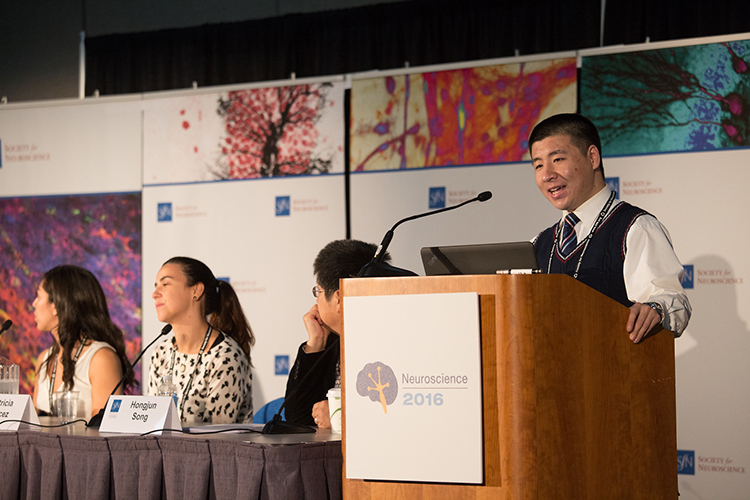
Advocating for the Neuroscience Community
Outreach to policymakers has been a central element of SfN’s mission since its founding nearly 50 years ago. In today’s highly charged political environment, it is more important than ever that scientists around the globe stand together in support of one another and the future of the scientific enterprise. SfN has a unique role to play both in representing the needs of the neuroscience community to policymakers and in equipping neuroscientists to do the same. SfN’s leadership seeks to expand the Society’s commitment to providing scientists worldwide with the tools and resources necessary for them be effective advocates for neuroscience.
“As scientists, we’re committed to advancing the process of discovery and contributing to a better understanding of the brain and central nervous system. But many of us have never received the tools and training required to communicate our work to the people responsible for the funding decisions that ultimate shape our future as scientists. That’s where SfN has such an important role to play,” said Bill Martin, chair of the SfN Government and Public Affairs Committee. “Whether you’re working with your local chapter, national society, or other members of your lab, SfN has the tools and resources to help you explain to the public and policymakers about the important work you’re doing.”
U.S. Efforts to Engage a New Congress and Administration
In the U.S., NIH and NSF have long enjoyed bipartisan support. However, the new Congress and administration will need to decide before the end of April whether to fund NIH and NSF at their current levels or increase funding for biomedical research. SfN and its members have a critical role to play in helping Congress and the president understand the importance of increasing investments in neuroscience and other forms of biomedical research so that sustained, robust growth in funding remains a top priority.
Some advocacy activities are designed to influence time-sensitive legislative actions, while others are intended to help build meaningful working relationships with elected officials throughout the year. Three actions SfN members can take now include:
- Joining the SfN Advocacy Network to get the latest information and suggested activities.
- Engaging your colleagues around advocacy through your local chapter or institution.
- Learning how congressional action affects your work through participation in programs such as SfN’s upcoming webinar “The Federal Budget Process and What It Means for Your Lab,” which will explore the decisions Congress must make for FY2017 and FY2018 as well as the prospects for “sequestration.”
There will also be opportunities to engage policymakers through action alerts, an easy way for members to contact their lawmakers when important policy or funding issues surface in Congress. Other SfN activities throughout the year will focus on helping members explain their research to policymakers. SfN can help members reach out to their elected officials to schedule a meeting or lab tour, prepare for meetings, and craft written materials such as an op-ed to a local paper.
In addition, SfN members will come to Washington, DC, on March 23 to participate in SfN’s annual Capitol Hill Day. Participants will include members of the SfN Early Career Policy Ambassadors Program, which provides members the opportunity to represent their colleagues as effective advocates for neuroscience.
SfN is also making investments to help inform the new Congress and administration about the importance of biomedical research. SfN will continue to cultivate its established relationships with policymakers who have been neuroscience supporters, while also working to grow the Congressional Neuroscience Caucus. Specifically, the Society aims to identify and form relationships with lawmakers whose districts are hubs for biomedical research as well as lawmakers on committees that deal with science-related issues.
SfN, along with partners such as Research!America, the American Brain Coalition, and the Coalition for Life Sciences, engages directly with policymakers in Washington, DC, emphasizing both the importance of funding, but also pressing the case for the free exchange of scientific ideas. In a recent statement, SfN Past President Hollis Cline said: “In all our efforts, SfN remains deeply committed to its core value of supporting, engaging, and welcoming diverse voices and scientific exchange between scientists of all nationalities. That core value is not going to change.”
Expanding Global Advocacy
Around the globe, SfN works closely with the International Brain Research Organization (IBRO), and other partners to promote and facilitate in-country advocacy efforts. “Encouraging global advocacy requires a recognition of the different social, political, and cultural dynamics in different countries,” said Larry Swanson, IBRO secretary-general and chair of the organization’s Global Advocacy Committee.
The IBRO-led Global Advocacy Initiative launched in 2014 with a goal of increasing public awareness of brain research and building support for neuroscience research around the globe. The program began providing seed grants in 2015 and has awarded 24 grants between €3,000-€5,000.
One example of the program’s success comes from Mongolia. The Mongolian Neuroscience Society at the Mongolian National University of Medical Sciences (MNUMS) used the seed grant funding to support four major activities, including the first-ever public event on neuroscience in Mongolia, attended by more than 300 people. The event included a free public neuroscience lecture, three interactive presentation stations about brain functions, two onsite consultation centers, and games to engage attendees. In addition, meetings took place with key decision-makers, including the department head of the Ministry of Education, Culture & Science and the director of the National Center of Mental Health, resulting in an agreement on the urgent need of neuroscience‐based advocacy in education, research, and policy in the country. MNUMS President Batbaatar Gunchin also announced that neuroscience was being introduced into the official university curriculum as an elective subject.
“Through working with SfN and others, IBRO has been able to facilitate successful advocacy programs in places including Argentina, Sri Lanka, and Egypt,” Swanson said. “These efforts are paying off with government commitments to fund neuroscience.”
Founding partners of the initiative include the Australian Neuroscience Society, the Dana Foundation, the Federation of European Neuroscience Societies, the International Society for Neurochemistry, the Japan Neuroscience Society, and SfN.
To learn more about SfN’s advocacy efforts and how you can get involved, sign up to join SfN’s Advocacy Network or email advocacy@sfn.org.























